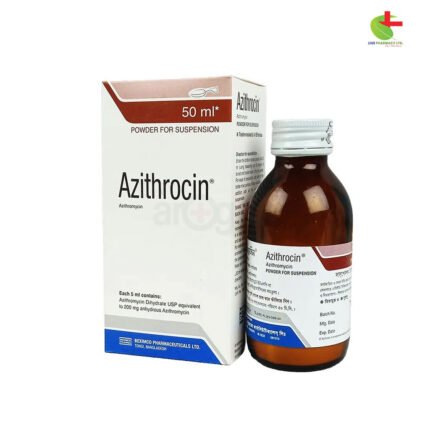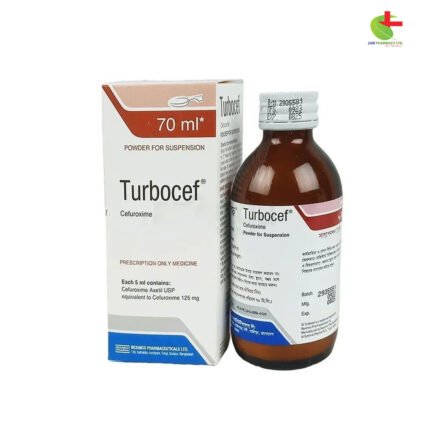Triocim Suspension
210.00৳ Bottle (50ml)
- Triocim is a broad-spectrum oral cephalosporin antibiotic effective against a variety of Gram-positive and Gram-negative bacteria.
- It is used to treat acute infections of the upper and lower respiratory tracts, and urinary tract infections.
- Triocim is stable against beta-lactamase enzymes, enhancing its effectiveness against resistant strains.
- It is typically administered for 7 to 14 days, with dosage adjustments for renal impairment.
 Brand
Brand
|
Beximco Pharmaceuticals Ltd |
|---|---|
 Generics
Generics
|
Cefixime Trihydrate |
 Type
Type
|
Powder for Suspension |
Indications
Triocim is a potent oral cephalosporin antibiotic known for its broad-spectrum bactericidal activity against both Gram-positive and Gram-negative bacteria. It is prescribed for the treatment of various acute infections caused by susceptible pathogens.
- Upper Respiratory Tract Infections (URTI): Effective for conditions such as otitis media and other upper respiratory infections where the responsible microorganism is resistant to commonly used antibiotics or where alternative treatments pose significant risks.
- Lower Respiratory Tract Infections: Includes bronchitis and other lower respiratory infections.
- Urinary Tract Infections: Treats conditions such as cystitis, cystourethritis, and pyelonephritis.
Triocim has shown clinical effectiveness against pathogens including Streptococcus pneumoniae, Streptococcus pyogenes, Escherichia coli, Proteus mirabilis, Klebsiella species, Haemophilus influenzae (both beta-lactamase positive and negative), Moraxella catarrhalis (both beta-lactamase positive and negative), and Enterobacter species. It maintains stability in the presence of beta-lactamase enzymes, which enhances its efficacy against resistant strains.
Pharmacology
Cefixime, a third-generation semi-synthetic cephalosporin antibiotic, is administered orally. It exhibits bactericidal properties against a wide range of Gram-positive and Gram-negative bacteria by disrupting bacterial cell wall synthesis. Cefixime remains effective in the presence of beta-lactamase enzymes, which often confer resistance to other antibiotics. It achieves significant plasma concentrations with 40-50% absorption, regardless of food intake.
Dosage & Administration
Cefixime absorption is not significantly affected by food. The standard treatment duration is 7 days, extendable to 14 days if necessary.
- Adults and Children over 10 Years: The typical dosage ranges from 200-400 mg daily, either as a single dose or divided into two doses, based on infection severity.
- Elderly: Dosage is generally the same as for adults, though renal function should be monitored and adjusted for severe renal impairment.
- Children:
- 6 months to 1 year: 3.75 ml daily
- 1-4 years: 5 ml daily
- 5-10 years: 10 ml daily
- For typhoid, 5 mg/kg body weight twice daily for 10-14 days.
Children over 50 kg or older than 10 years should receive the adult dosage of 200-400 mg daily. Safety and efficacy for children under 6 months have not been established.
Renal Impairment: In cases of impaired renal function, dosage should be adjusted. For creatinine clearances of 20 ml/min or greater, normal dosing is appropriate. For clearances below 20 ml/min, the dose should not exceed 200 mg once daily.
Interaction
Similar to other cephalosporins, Triocim may increase prothrombin times in some patients, particularly those on anticoagulant therapy. Caution is advised.
Contraindications
Triocim is contraindicated in patients with a known hypersensitivity to cephalosporin antibiotics.
Side Effects
Triocim is generally well tolerated. Common side effects include:
- Gastrointestinal: Diarrhea (more common at higher doses), nausea, abdominal pain, dyspepsia, vomiting, and flatulence. Pseudomembranous colitis has been reported.
- Central Nervous System: Headache and dizziness.
- Hypersensitivity: Allergic reactions such as rash, pruritus, urticaria, drug fever, and arthralgia, which usually resolve after discontinuation.
- Hematological: Thrombocytopenia, leukopenia, and eosinophilia (infrequent and reversible).
- Miscellaneous: Genital pruritus and vaginitis.
Pregnancy & Lactation
There are no well-controlled studies on the use of Cefixime in pregnant women. It should be used during pregnancy only if necessary. The excretion of Cefixime in human milk is unknown, so caution is advised when administering to nursing mothers.
Precautions & Warnings
Triocim should be used with caution in patients with a history of hypersensitivity to other drugs, especially penicillins, due to potential cross-reactivity. It should be avoided if severe allergic reactions occur. Use in patients with impaired renal function and those at risk for Clostridium difficile-associated diarrhea should be carefully monitored. Triocim is not recommended during pregnancy or breastfeeding unless absolutely necessary.
Overdose Effects
In cases of overdose, gastric lavage may be indicated. There is no specific antidote, and Triocim is not significantly removed by hemodialysis or peritoneal dialysis. Adverse reactions observed in high doses in healthy volunteers were similar to those at recommended doses.
Therapeutic Class
Third Generation Cephalosporins
Storage Conditions
Store below 30ºC, protected from light and moisture. Keep out of reach of children.













Reviews
There are no reviews yet.